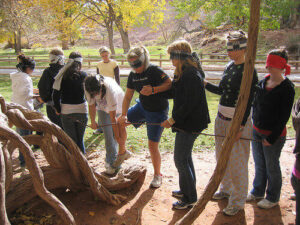
The role of a therapist at New Haven is a vital. We work to build relationships with each family that comes to us, we work hard to maintain the current relationships and then we keep up our relationships even after the family transitions from our program.
What does this look like? Here is an example.
When Susie first arrived at New Haven, she was really sad and upset about being away from home. She was terribly homesick, highly anxious and still questioning if there is any hope for her. As she meets the team at New Haven, she meets her therapist. She sees her therapist formally for sessions each week, both individual therapy and family therapy. She will also be involved in group therapy with her therapist. But, more importantly, she will rub shoulders with her therapist at lunch, in casual moments in the house and during group activities. They will have casual chats during breaks or process through something that popped up during the non formal therapy times. Susie will be able to come “hang out” in her therapist’s office, maybe with some peers or on her own. They connect in a way that’s beyond the typical “office” relationship. The therapist knows that Susie will likely learn about relationships and achieve connection within herself as she builds a strong relationship with her therapist. They may swing on the swings together, they may go hiking together, they may play with the animals together, they may cry together, they may laugh together.
Susie’s therapist will develop a deep, trusting relationship with Susie. The therapist will also develop a deep, trusting relationship with Susie’s parents. The therapist will challenge the parents as much as Susie is being challenged. The therapist will model healthy relational dynamics to the family, challenge unhealthy dynamics and invite the whole family to make changes.
When the time arrives, Susie’s therapist will help the whole family prepare for Susie’s transition back home. And then, after Susie returns home, the therapist will participate in coaching sessions to help the family continue using the healthy patterns they established at New Haven.
A New Haven therapist will do more than create unconditional positive regard for the families they work with. New Haven therapists love the families they work with. And, because of that love, are able to lovingly guide the family to make the changes necessary for them to achieve the level of healing they are looking for.
By, Kjrstin Walters, LMFT